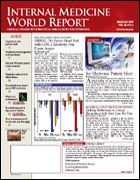Publication
Article
Internal Medicine World Report
Second Surgery Beneficial in Patients with Chronic Sinusitis
Author(s):
PHILADELPHIA—Patients with chronic sinusitis who have had sinus surgery in the past can still benefit from a second endoscopic sinus surgery, according to findings presented at the annual meeting of the American College of Allergy, Asthma & Immunology.
This retrospective study included 50 patients with chronic sinusitis who were scheduled for endoscopic sinus surgery and who completed a baseline assessment. Disease-specific scores from the rhinosinusitis quality-of-life and chronic sinusitis surveys, and generic health-related quality-of-life (HRQOL) scores were measured at baseline and at follow-up. Patients were also asked to complete a survey at 3 months postsurgery.
The history of allergy and asthma symptoms was similar among those with and without previous surgery.
A total of 21 (42%) of the patients reported a history of previous sinus surgery, 16 of whom completed 3-month postsurgical follow-up. Overall, these patients were older and were more likely to have polypoid disease and mucopurulent drainage but less likely to have septal deviation on endoscopic examination. Imaging studies showed they had more sinus cavity involvement. In addition, their baseline HRQOL scores were worse than those of patients without previous surgery.
At 3 months of follow-up, patients with a previous surgery had clinically significant improvements in their HRQOL. Despite having worse baseline symptoms, the changes in HRQOL scores were similar to those of patients with no surgical history.
“Sometimes physicians may think that surgery won’t help again if symptoms recur after prior sinus surgery, but with our validated survey we found that was not the case,” said lead investigator Steven Atlas, MD, MPH, of Harvard Medical School.
He said it was important that patient global ratings of outcomes at 3 months were similar, regardless of previous surgery status. The 2 groups also had similar changes from baseline in disease-specific and generic HRQOL subscale scores.
IMWR
“This study is important and may be of particular interest to primary care doctors, because few studies have been published that have looked at validated measures, and very little information has been published on outcomes of patients after surgery,” Dr Atlas told . “We know that surgery is beneficial, but we have never had studies that looked at whether past treatments affect patients in a negative way. It is reassuring to report that we didn’t find that was the case.”
He noted that “it’s helpful to tell patients that surgery remains an option if they aren’t getting better.” But he added the caveat that “this is a retrospective study, and it is limited because of its small sample size.”





